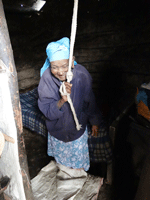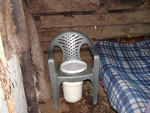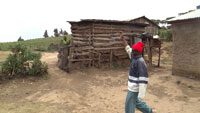Kenya - A String, a Jug, and a Bucket
A String, a Jug, and a Bucket
In Kenya WASHplus and the Ministry of Health (MOH) are training community health workers and recruiting natural leaders to advance sanitation among vulnerable households. Using a small doable action approach, trainees work with households to make simple improvements to ensure all family members can access a latrine and a hand washing station. This often means that community health workers are improvising and innovating to help address the particular needs of a given family. The following three stories illustrate simple innovations that made a profound impact on individuals’ lives.
WASHplus Toilet Solution Puts a Smile on a Grandmother’s Face
Maria Njeri sits by her bed with an eager face. Said to be over 100 years old, she is blind and cannot walk. A team from the USAID-supported WASHplus project and the Ministry of Health is visiting the grandmother in the Maai Mahiu area of Nakuru County in Kenya’s Rift Valley region. They want to find out first-hand how community health worker volunteers trained by the project are helping Maria cope with the daily challenges that elderly people like her face. 
When her daughter and granddaughter are away during the day, she has no one to help her to the latrine, located a few meters from the house. A small bucket indoors is her only alternative, but it is not easy to use because of her old age and ailing legs. The strain can be unbearable and sometimes she does not make it to the bucket in time.
The WASHplus program trains public health officers and volunteers to find alternative solutions to make it easier for elderly people like Maria to practice good hygiene. Maria’s plight came to light when local volunteers went round the village to educate people. They helped the family members devise a solution to Maria’s mobility problems—an improvised toilet seat with the bucket fixed at the bottom, which is comfortable and easy to clean. The team also attached an arm string to the roof to help Maria stand and exercise. Her joy is evident. With regular exercise the pain in her legs is gone and she no longer dreads using the toilet.
Maria’s neighbors, also elderly women in their 60s and 70s, have also benefitted from the intervention. One neighbor, Naomi Muthoni, describes what she learned at a community meeting: “We were taught that after every visit to the toilet, you must wash your hands with water and soap, or use ash. We wash hands all the time and make our children also wash their hands. Our children used to defecate openly in the garden and in the bushes around our homesteads,” she adds. The community is strict about reminding them to use latrines and ensuring that all neighbors have tippy taps (a simple water-saving hand washing device) installed. Since these approaches were adopted, the community has seen a reduction in diarrhea among its children. 
Elderly Mother and Son Benefit from Simple Innovation
At 80 years old Leah Njoki still has the energy to do most of her chores and work on her small farm; her only problem is failing memory and pain in one of her legs. Mrs. Njoki was among the first people to adopt the good hygiene practices promoted by WASHplus after a visit by health worker volunteers, who were promoting community-led total sanitation.
Mrs. Njoki says health workers taught her how to keep her latrine clean and the importance of using it instead of defecating in the open to prevent disease. A lot has changed since that visit. She recalls days when she never washed her hands after using the latrine. Sometimes she would wash in kitchen containers, not knowing the health risks. Now she and her grandchild always wash their hands after visiting the toilet using soap or ash. She has installed a tippy tap near the toilet. Previously she used to put water in a basin for hand washing. The same water was used over and over. 
The grandmother has also benefited greatly from an arm string that health workers fixed in the latrine to help her support herself and reduce the strain on her bad leg. “Whenever I have a problem getting up, I support myself with the arm string” she says.
Mrs. Njoki’s second son, Paul Mwaura, who lives in another district, is amazed by the innovations his mother has adopted. Paul’s right leg was amputated following a road accident in 2003, and he walks with crutches. Using the pit latrine is usually a big challenge because he has to balance on his good leg. He found out that with the string, he can balance with ease. “These days when I go to the toilet I don’t fear falling down, since there is a string to support me. Now if I find someone else with a problem similar to mine I will inform them also about the innovation,” he says. Mr. Mwaura plans to install a string for support in the latrine back at his new home along with a tippy tap.
A Simple String Solves Problem for Blind Youth
Three years ago Danson Ndung’u was a popular mechanic and driver in Nairobi’s biggest slum Kibera. Today he can neither drive nor fix cars. The 20-year-old’s career ended when a violent mob beat and blinded him during election year violence in 2010. The attack changed Danson’s life for good, ending his promising career, independence, and ability to support his mother and four younger siblings.
After three months in the hospital, he struggled to adapt to the fast-paced lifestyle of home and moved to a quieter rural area, Sision Village in Maai Mahiu, Rift Valley, to live with his married elder sister. In the serenity of the village, Danson slowly began to cope with life as a blind person. He enrolled in a knitting course at Thika School for the blind.
Whenever he came home for holidays, Danson felt robbed of his privacy. He felt helpless having to depend on somebody to get him to the toilet, a few meters from the house. Even though he has learned to use a white cane, he still finds it hard to move around at home because of the rocky terrain. 
Peter Maina Njoroge, a WASHplus-trained volunteer, visited Danson’s home and heard about the challenge Danson faced reaching the toilet. Although Mr. Njoroge and his colleagues had not come across such a problem before, they quickly came up with a solution. They tied a blue nylon string running from the house to the toilet to guide Danson. This simple modification worked. Two months later Danson reports, “I can now go to the toilet alone even when there is no one around. Before I used to wait for them to come from the farm so that one could come and help me.”
Although he still faces many challenges in moving around his village, the simple string has eased his life and given him back his privacy. To him it is a step toward regaining the joyful life he once had.

